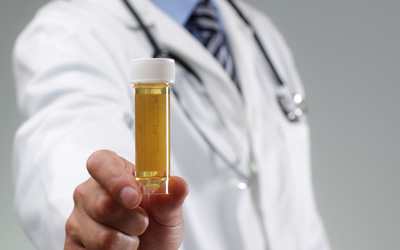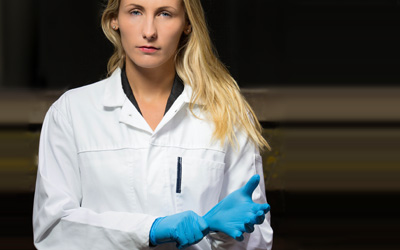The International Association of Forensic Nurses (IAFN) describes forensic nursing as the “application of nursing science to public or legal proceedings.” Unlike other types of nurses, forensic nurses treat victims of sexual crimes - both adults and children - help police gather evidence from crime scenes and testify in court. Since the founding of IAFN in 1992, this relatively new profession has been gaining momentum in the United States. Forensic nursing programs train students for the countless challenges within this field.
What do forensic nurses do?
-
Play a fundamental role in curbing sexual violence and related crimes
-
Work with victims of sexual assault, neglect, abuse and violence
-
Document details of injuries to victims
-
Gather and record evidence
-
Assist police at crime scenes
-
Provide testimony at trials
-
Collect samples from suspects and victims alike
-
Have knowledge of the legal system
-
Investigate and determine causes of death
-
Have knowledge of forensic photography
Forensic nursing – Specialties
Forensic science is one of the newest specialty areas in the field of nursing; however, it has its own subspecialty areas, such as:
-
Medical-legal consulting
-
Forensic psychiatric nursing
-
Death investigation
-
Sexual assault
Sexual assault remains the largest subspecialty in forensic nursing.

How to become a forensic nursing professional?
If you’re interested in becoming a forensic nurse then you need to be academically qualified, trained and licensed. All forensic nurses, in essence, are registered nurses.
How to become a registered nurse – A brief summary
-
Enroll in a community college for a 2-year Associate Degree in Nursing (ADN), or
-
Enroll in a 4-year college for an undergraduate degree in nursing i.e. Bachelor of Science in Nursing (BSN)
-
Pass the NCLEX-RN exam – This is mandatory to get licensed; your state may have additional requirements
Once you’ve become a registered nurse, your formal training to become a forensic nurse may start.
A forensic nurse program such as Certificate in Forensic Sciences may be enough to get you started in this field. It may also help you gain foundational knowledge in:
-
Legal and ethical issues
-
Evidence collection and preservation
-
Recognition of domestic violence and assault
-
Forensic documentation
Students may be able to complete the following certification online
-
Abuse
-
Social, psychological and physical violence
Who should enroll in the certificate program?
As mentioned earlier, the certificate is ideally for those registered nurses seeking career advancement opportunities in their field. Graduates may be able to secure positions in a variety of settings, such as:
-
Psychiatric hospitals
-
Public health departments
-
Correctional facilities
-
Medical examiners/coroner offices
-
Community based anti-violence centers
-
Hospitals

Job titles
Some of the job titles that come with this are
-
Legal nurse consultant
-
Assault or abuse nurse examiner
-
Nurse coroner
-
Emergency room forensic nurse
-
Correctional facility nurse
-
Forensic clinical nurse specialist
-
Medical examiner nurse investigator
Forensic nurse degree
In addition to the certificate program, degrees are also offered in the field. These may be offered online as well as traditionally on campus.
MSN Forensic Science
This is a post-graduate degree, which typically takes 2 years to complete. It ideally suits those who are interested in helping law enforcement and legal professionals do their job effectively as well as help victims of crimes.
The curriculum of the program focuses on violence and its physical, psychiatric and social implications for both the victim and society at large. The degree not only prepares its students for forensic nursing but also for leadership roles. Graduates may assume the role of policy makers at local, state and federal levels, design educational curricula and create hospital-based programs.
Forensic nurse courses may be divided into core and specialty courses, wherein the core courses may be titled as:
-
Pathophysiology/Pharmacology for Advanced Practice Nursing
-
Physical Assessment for Advanced Practice Nursing
-
Clinical Prevention and Population-Based Health Promotion
-
Health Care Ethics in Practice and Policy
-
Organizational and Clinical Leadership in Nursing and Health Care
-
Evidence Based Nursing Practice and Policy Development
-
Historical and Contemporary Foundations for Advanced Nursing Practice
Some of the specialty courses are mentioned below:
-
Forensic Clinical and Capstone
-
Advanced Forensic Nursing I – Theory and Practice
-
Advanced Forensic Nursing II – Program Development, Leadership & Policy
-
Criminal Law and the Courts
-
Forensic Science and the Legal System

Is the right career for you?
On the whole, nursing is a challenging profession. The challenges faced by forensic nurses are unlike other registered nurses. Working with children who are victims of sexual violence is perhaps the most challenging aspect of the job. Forensic nurses also perform a dangerous duty when they take evidence from suspects. The job can be emotionally draining and at times highly stressfully.
Keep the above in mind when deciding to become a forensic nurse.
How can you excel in this career?
All nurses, irrespective of their specialties, require the same set of skills to pursue a successful career. These include:
-
Critical-thinking skills
-
Communication skills
-
Physical stamina
-
Organizational skills
-
Emotional stability
-
Detail oriented
-
Compassion
Forensic nursing, in short, is one of the newest additions to the field of nursing and criminal justice. The job is demanding, requires physical and psychological strength as well as compassion to succeed.
Did you know:
-
that television shows such as Bones and CSI depict a bit of what forensic nurses do in their daily professional life?
-
that forensic nursing started as early as 1992?
-
that the origins of the field are in the city of Minneapolis?